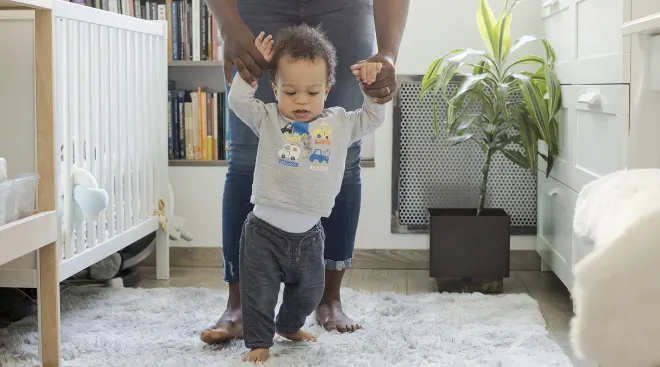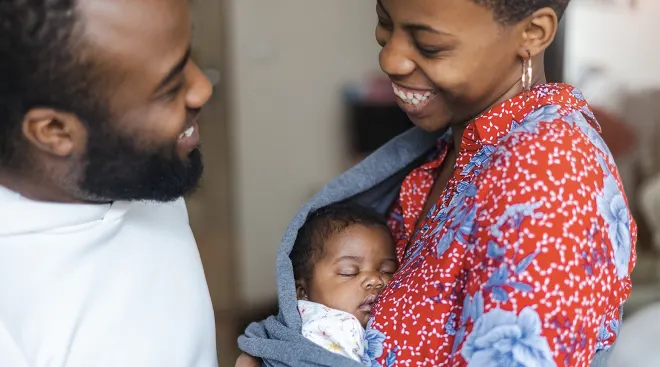Developmental Baby Milestones by Month
The first smile, the first step, the first word: Most parents remember exactly when their baby accomplished these big goals. But before baby reaches each one, you’re probably eager to know when to be on the lookout for important baby milestones, camera at the ready.
While it’s helpful to understand how baby development generally unfolds, you shouldn’t feel like you have to obsessively monitor your child’s progress against a developmental milestones chart. As long as you’re keeping up with baby’s well visits, their doctor will keep track for you. “Pediatricians will ask parents questions about their child’s development at each well visit and look for certain developmental [concerns],” says Karen Fratantoni, MD, MPH, a medical officer with the US Food and Drug Administration (FDA) in Maryland.
Also, keep in mind that every baby is unique, and there’s a range for when children achieve their infant developmental milestones. To better reflect this, the Centers for Disease Control and Prevention (CDC) and American Academy of Pediatrics (AAP) adjusted their milestones guidelines in February 2022. The updates outline broader age ranges for milestone achievement, and since 75 percent of children generally fall within these ranges, developmental delays may be easier to spot, says Alexis Phillips-Walker, DO, a pediatrician at Memorial Hermann Medical Group Pediatrics in Atascocita, Texas. “These milestones enable parents to get help for their children earlier compared to the ‘watchful waiting’ approach previously associated with the older guidelines,” she explains.
The below baby milestones chart gives you an overview of what your child’s behavior may be like at each age—and when you can expect to check the big developmental milestones for babies off the list. But of course, remember every child is different and will hit their picture-worthy milestones at their own pace.
Believe it or not, babies learn lots of skills in utero that they’ll show you after birth. Most of these newborn milestones help baby adapt to and thrive outside of the comfort of the womb, the AAP notes.
Monthly newborn milestones
See what else baby will be doing as a newborn here.
Baby’s senses are still developing—and they’ll be busy testing them out to help make sense of this strange new world.
Monthly baby milestones
- Notices faces
- Sees bold patterns, especially in black and white
- Recognizes the sound of your voice
- Brings hands within range of their eyes and mouth
See what else baby will be doing at 1 month here.
The CDC’s 2022 milestone guidance starts at 2 months. Observe these two-month developmental newborn milestones closely—if baby isn’t achieving them, your pediatrician may want to explore further. “The ability to track an object is important,” says Carrie Brown, MD, a pediatrician at Arkansas Children’s Hospital in Little Rock, Arkansas, because the inability to do so may indicate a visual or brain impairment, “just like not turning their head to sounds could indicate a hearing issue.”
Monthly baby milestones
- Starts to coo and make sounds beyond a simple cry
- Starts to smile at people
- Briefly calms when spoken to or picked up
- Can briefly self-soothe by bringing their hands to their mouth
- Begins to follow things with eyes and recognizes people
- Turns their head in the direction of sounds and reacts to loud sounds
- Makes smoother movements with their arms and legs
- Holds their head up when lying on their stomach
See what else baby will be doing at 2 months here.
How time flies—baby is no longer considered a newborn! Baby’s emotional skills are developing: They may start to use different cries to tell you what they’re feeling and begin to enjoy playing with other people.
Monthly baby milestones
- Can distinguish your face from others
- Starts to have different cries for different needs—hunger, diaper change, pain, etc.
- Opens and shuts their hands
- Swipes at dangling objects
- Follows moving objects with their eyes
- Enjoys playing with other people (and may cry when the playing stops)
See what else baby will be doing at 3 months here.
Baby is becoming more alert and eager to explore the world around them. At this age, you might hear baby’s adorable chuckle or watch them try to lift themselves up during tummy time.
Monthly baby milestones
See what else baby will be doing at 4 months here.
The skills baby is building now may seem small, but they form the foundation for bigger skills that’ll pop up later on the infant milestones chart—and may help your doctor diagnose an issue early if you notice something isn’t right. “All the milestones are a big deal because they build upon one another,” says Natasha Burgert, MD, FAAP, a pediatrician at Pediatric Associates in South Overland Park, Kansas, and blogger behind KC Kids Doc. “You can’t walk if you can’t pull up. You can’t speak in sentences if you don’t have simple words.”
Monthly baby milestones
- Babbles
- Entertains themselves for short periods of time
- May be becoming more aware of strangers
- May be rolling over more
See what else baby will be doing at 5 months here.
At the six-month mark, baby may be ready to start accomplishing some huge developmental milestones—including those associated with mobility! But even if they don’t start creeping (pushing themselves around on their tummy) at 6 months, there’s no reason to worry. “There’s a range of time during which each skill is expected to develop, and that range can be narrow for some and wider for others,” Fratantoni says.
Monthly baby milestones
- Rolls over from tummy to back (though some babies may accomplish this earlier, around 4 months)
- Explores toys by putting them in their mouth
- Reaches for toys they want
- Loves to look at themselves in a mirror
- Starts creeping along the floor
- Passes things from one hand to the other
- Starts to understand simple words
- Leans on hands for support when sitting
See what else baby will be doing at 6 months here.
Baby is becoming a little scientist and manipulating surrounding objects to learn more about them. That can lead to the pretty annoying habit of dropping things onto the floor, but it’s an encouraging sign of baby’s curiosity.
Monthly baby milestones
- Enjoys dropping things on the floor
- May start to copy sounds and gestures of others
- Can process and understand a wide range of sounds
- Finds partially hidden objects
- Sits up without support
See what else baby will be doing at 7 months here.
At this age, you might be paying particular attention to baby’s developing mobility—especially if you’re babyproofing to help keep your little explorer safe. “Parents may focus more closely on one domain of a child’s development, such as gross motor skills like crawling or walking on time, but I think it’s helpful for parents to consider all domains of a child’s development,” Fratantoni says. This is especially important because some babies never crawl at all—they skip straight to walking! In fact, the developmental milestone isn’t listed in the CDC’s 2022 guidance for this very reason.
Monthly baby milestones
- Begins crawling
- May be able to stand while holding onto something
- May start to lean over to pick up toys
- Lifts arms to be picked up
See what else baby will be doing at 8 months here.
Your babbling baby may start to experiment with different tones and sounds as they inch toward one of the biggest infant developmental milestones—talking. But experts say not to worry if you aren’t hearing that long-awaited “mama” or “dada” quite yet. “Not all children talk at the same time, but they should make constant forward progress,” Brown says. “Children progress from cooing to consonant sounds to simple words to two-word phrases to small sentences.”
Monthly baby milestones
- May be wary of strangers and clings to familiar people
- Has favorite toys
- Makes a lot of different sounds, like “mamamama” and “bababababa”
- Uses fingers to point at things and “rake” food towards themselves—and probably has or soon will have a pincer grasp (using the thumb and index finger)
- Responds to their name
- Plays simple games like peekaboo
- Gets into a sitting position without help and sits unaided
- Begins to understand object permanence, and looks for objects dropped out of sight
- Explores things in different ways, like shaking, banging and throwing
See what else baby will be doing at 9 months here.
If you’re part of a playgroup, you may start to see a wide range of abilities emerge at this age—many babies may still be crawling, but some may be already starting to cruise (shuffling along while holding onto furniture). A few bold souls may even be nearly ready to take their first steps. All of them are right on track.
Monthly baby milestones
- Starts to develop a pincer grasp
- Begins feeding themselves finger food, thanks to better hand-eye coordination
- Develops separation anxiety
- Has different facial expressions to show emotions, such as happy, sad and surprised
See what else baby will be doing at 10 months here.
Even if baby hasn’t taken their first step, don’t rush them. “A baby milestone chart is a great guide to see if baby is working toward expected physical, verbal and social goals. The exact progression, however, can’t be rushed or pushed forward any faster than your baby’s brain allows,” Burgert says. “What’s most important is to enjoy every phase of development as it’s occurring. When you crave fast progress, you can miss the magic of the moment.”
Monthly baby milestones
- Crawls up the stairs (while supervised)
- Makes sounds with changes in tone (sounds more like speech)
- Waves and/or claps
See what else baby will be doing at 11 months here.
Congratulations! Baby has officially graduated to toddler status. You can look back on all the amazing things on the baby milestones chart that your child has mastered over the past 12 months—it’s quite a lot!
Monthly baby milestones
- Uses basic gestures, like shaking their head “no” or waving “bye-bye”
- Begins to respond to “no”
- Says “mama” and “dada,” and exclamations like “uh-oh!”
- Starts to use things correctly; for example, drinks from a cup or brushes their hair
- Can pick things up (like small bits of food) between thumb and forefinger (pincer grasp)
- Pulls up to stand and may be able to stand alone
- Starts cruising (walking while holding onto furniture)
See what else baby will be doing at 12 months here.
Safe to say, baby will go through several infant milestones during that first year of life. Use the below baby milestones chart to see all the big moments they’ll have in one easy place.
While it’s important to keep an eye on these markers, the ages at which babies will meet them are not set in stone. Every child progresses at their own speed, and doctors say not to be overly concerned if your little one isn’t hitting the baby milestones exactly when the developmental milestones chart says they should. “Children develop along a spectrum, and not all children do things at the same time or according to any baby milestone chart that parents may have,” Brown says. Your little one might be quick to start crawling but slower when it comes to walking. Or they may not speak for months, only to wake up one day talking up a storm.
Frequently Asked Questions
When do babies smile?
While you might see a “reflexive” smile from baby in the early weeks, babies typically don’t learn how to consciously smile until 2 or 3 months of age. By this time, babies start to socially smile in response to their surroundings. Be sure to have your camera ready!
When do babies start laughing?
Babies usually learn to chuckle around 3 or 4 months, and fully laugh) around 6 months. If you’re eagerly waiting to hear baby’s giggle, these are the months to start listening for it.
When do babies begin rolling over?
Babies typically begin rolling over around the four-month mark. At this time, baby is getting stronger and will likely practice pushing their chest off the ground and rocking side to side, eventually making a complete roll from their belly to their back. By 6 months, babies have usually mastered rolling from their backs to their bellies and vice versa.
When do babies start crawling?
While the 2022 CDC guidelines do not include age ranges for crawling, some babies achieve this developmental milestone as early as 6 or 7 months old, while others wait until closer to 10 months. Keep in mind, though, that some babies skip crawling altogether and go straight to walking.
When can babies see in full color?
At birth, baby will only see shades of black, white and gray. As their eyes begin to develop, they’ll slowly begin to differentiate between hues. By 7 months, baby should be able to see the full spectrum of colors.
When do babies start talking?
Babies will usually begin cooing around 2 months, babbling around 6 months and will slowly progress to forming words. By 12 months, many babies will begin saying their first words like “mama” or “dada.” However, some babies prefer to take their time when it comes to speaking, so be patient.
When do babies begin walking?
Babies can begin experimenting with walking as early as 9 months. However, it’s not uncommon for some babies to wait until the one-year mark—or as late as 18 months—to take those first steps.
If you are at all concerned about baby’s development, don’t hesitate to bring it up with your child’s pediatrician, as there’s a lot of value in early intervention. “The biggest reason for concern is if you feel your child isn’t moving forward and making progress toward new skills,” Brown says. They’ll complete an assessment and, if necessary, recommend next steps.
Please note: The Bump and the materials and information it contains are not intended to, and do not constitute, medical or other health advice or diagnosis and should not be used as such. You should always consult with a qualified physician or health professional about your specific circumstances.
Plus, more from The Bump:
Carrie Brown, MD, is a pediatrician at Arkansas Children’s Hospital in Little Rock, Arkansas. She earned her medical degree at Ross University School of Medicine and completed her residency at Central Iowa Health Systems Program.
Natasha Burgert, MD, FAAP, is a pediatrician at Pediatric Associates in South Overland Park, Kansas, and the blogger behind KC Kids Doc. She earned her medical degree from University of Nebraska Medical Center in Omaha, Nebraska.
Karen Fratantoni, MD, MPH, is a medical officer with the US Food and Drug Administration (FDA) in Maryland. She earned her medical degree from Eastern Virginia Medical School in 1996.
Alexis Phillips-Walker, DO, is a pediatrician with Memorial Hermann Medical Group Pediatrics Atascocita in Atascocita, Texas. She earned her medical degree at Ohio University College of Osteopathic Medicine in Athens.
Centers for Disease Control and Prevention (CDC), Important Milestones: Your Baby By Six Months, June 2023
Healthy Children (American Academy of Pediatrics), Newborn Reflexes, March 2022
Learn how we ensure the accuracy of our content through our editorial and medical review process.
Navigate forward to interact with the calendar and select a date. Press the question mark key to get the keyboard shortcuts for changing dates.





















































